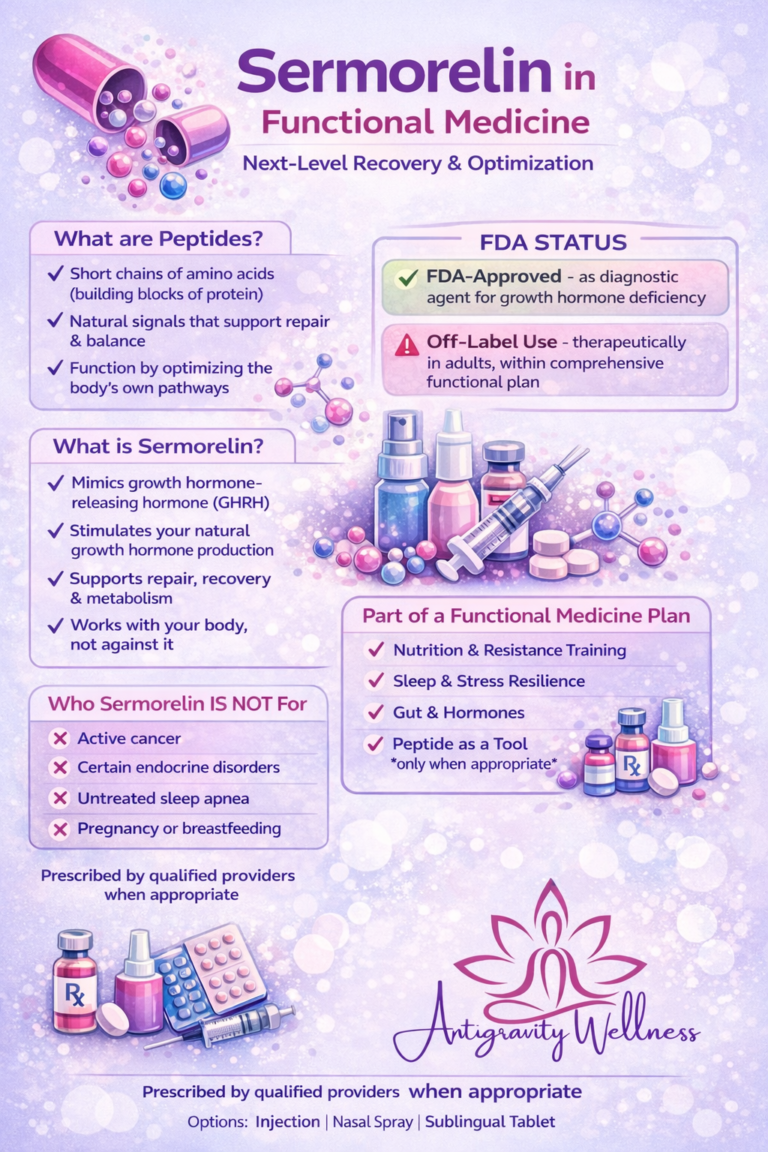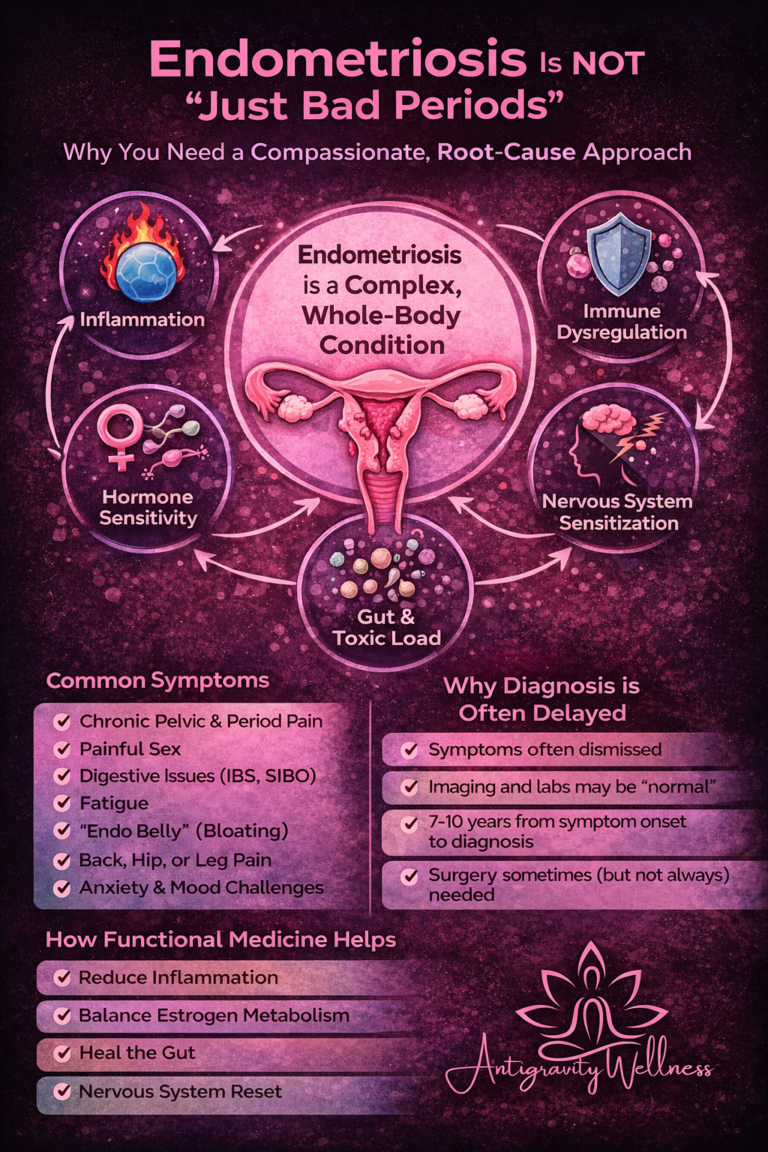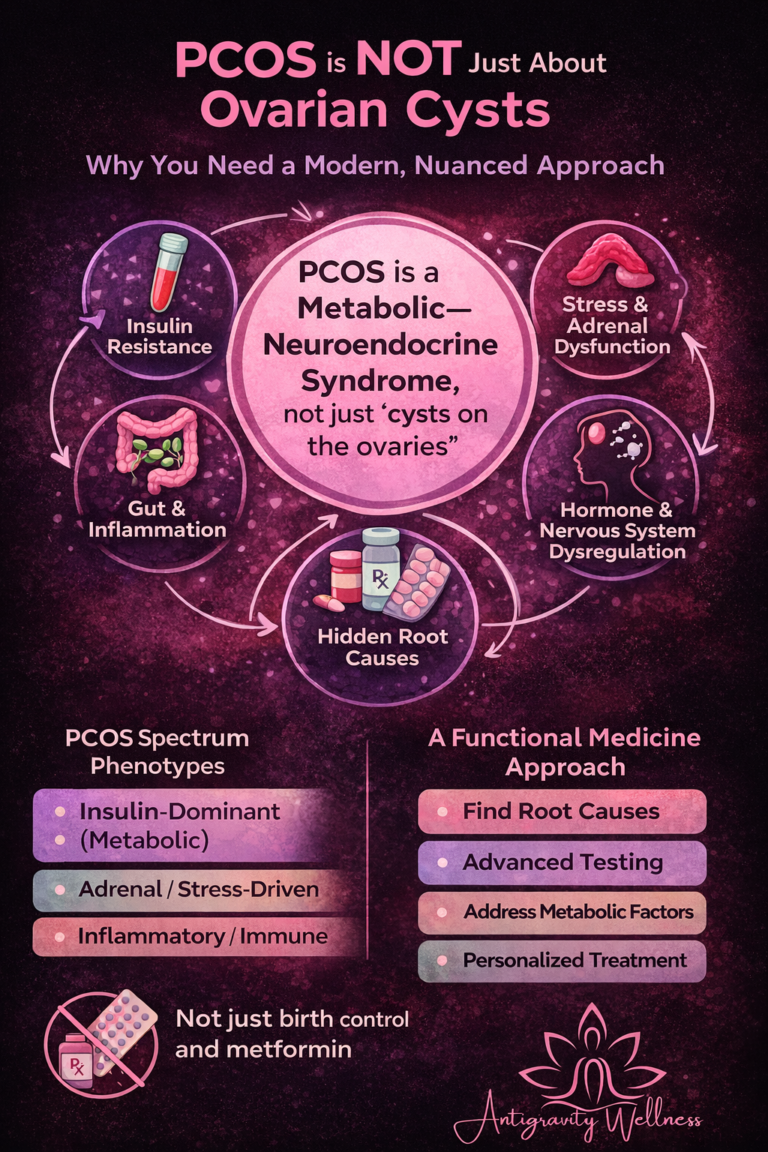
Allison, 44, felt like her body had turned against her. She had finally committed to a healthier diet—fresh vegetables, lean protein, and smoothies with greens. But instead of feeling better, she was more bloated than ever. Her belly looked 5 months pregnant by noon, and the gas and cramping made her dread every meal. She was even starting to avoid certain foods she loved—like garlic, apples, and broccoli—because they made everything worse. Her doctor told her it was probably just “IBS.” But she knew it was something deeper.
What Is SIBO?
SIBO stands for Small Intestinal Bacterial Overgrowth, and it occurs when bacteria that should be primarily in the large intestine overgrow in the small intestine.
When this happens, these misplaced bacteria ferment carbohydrates prematurely, creating gas, bloating, and inflammation. There are three main types:
- Hydrogen-dominant SIBO – often causes diarrhea
- Methane-dominant SIBO – more likely to cause constipation
- Hydrogen sulfide-dominant SIBO – associated with foul-smelling gas and fatigue
SIBO is one of the most common yet overlooked causes of chronic digestive symptoms—and women over 35 are especially at risk.
Why SIBO Is More Common in Perimenopause and Menopause
Hormones play a huge role in gut health—and as they fluctuate in your 30s, 40s, and beyond, your digestive system becomes more vulnerable to dysfunction. Here’s why:
- Progesterone naturally slows gut motility, and when it drops during perimenopause, your digestion may become sluggish and irregular.
- Estrogen fluctuations can disrupt bile production and gut microbial diversity.
- Stress and high cortisol levels reduce stomach acid and enzymes, making it easier for bacteria to migrate and overgrow. [^1]
- Thyroid dysfunction, gallbladder issues, and surgical adhesions also increase SIBO risk.
If you’ve had chronic constipation, food poisoning, long-term stress, or frequent antibiotic use—SIBO could be brewing under the surface.
Common Risk Factors for SIBO
SIBO rarely develops in isolation. It’s often the result of multiple overlapping stressors on the digestive system. Risk factors include:
- History of gallbladder removal (cholecystectomy): Bile plays a critical role in keeping bacteria in check. Without it, bacteria can more easily overgrow in the small intestine.
- Chronic constipation: Slowed transit time allows bacteria to accumulate.
- Frequent or recent antibiotic use: Wipes out good bacteria, giving bad bacteria room to grow.
- Food poisoning or gastroenteritis: Can damage the nerves of the gut and lead to long-term motility issues.
- Acid-blocking medications (PPIs): Lower stomach acid means less protection against incoming pathogens.
- History of abdominal surgeries or endometriosis: Adhesions can physically slow motility and create pockets of bacterial overgrowth.
- Hypothyroidism or Hashimoto’s thyroiditis
- IBS diagnosis that hasn’t improved with dietary changes
- Long-term use of opioids or narcotics
If any of these apply to you, and you’re dealing with chronic bloating, irregular stools, or unexplained fatigue, it’s time to dig deeper.
How We Test for SIBO
At Antigravity Wellness, we go beyond symptom management. We use advanced functional testing, like the GI MAP and SIBO breath testing, to uncover the root cause of your digestive dysfunction—so your treatment is targeted and works faster.
We may also run:
- DUTCH hormone testing to assess how hormone imbalances may be impacting your gut
- Comprehensive thyroid panels
- Food sensitivity panels to evaluate immune-triggering foods
You don’t have to guess which protocol you need—we test first so we can treat effectively.
Holistic Strategies for Healing SIBO
Healing from SIBO isn’t just about killing bacteria—it’s about restoring balance and function to the whole digestive system. Here’s how we approach it:
✅ Step 1: Reduce the Overgrowth
- Herbal antimicrobials like berberine, oregano oil, neem, or allicin (specific to the SIBO type)
- Prescription antibiotics like rifaximin or neomycin in select cases
✅ Step 2: Support Gut Motility
- Prokinetics like ginger, bitters, or low-dose naltrexone to prevent recurrence
- Nervous system regulation through stress management, yoga, or vagal nerve support
✅ Step 3: Rebuild and Rebalance
- L-glutamine and zinc carnosine to repair gut lining
- Targeted probiotics (only once overgrowth is cleared)
- Personalized nutrition support, including a low-FODMAP or elemental diet, short-term
Find our professional-grade gut healing supplements in the Fullscript Supplement Shop—but always check with your provider before starting a new protocol.
Conventional Medical Treatments for SIBO
In traditional medicine, doctors may offer:
- Antibiotics like rifaximin to target bacterial overgrowth
- Antimotility medications or antispasmodics
- Occasionally, elemental diets or bile acid binders
However, these strategies often miss the big picture—why the overgrowth happened in the first place. That’s why a root-cause approach is essential for long-term relief.
Case Study: Meet Lauren
Lauren, 47, came to Antigravity Wellness after struggling with severe bloating, fatigue, and constipation for over a year. She had seen multiple doctors and tried a dozen different supplements—but nothing worked for long.
We ran a SIBO breath test and GI MAP, which revealed:
- Methane-dominant SIBO
- Poor enzyme output and bile flow (she’d had her gallbladder removed at 39)
- Low estrogen clearance and signs of estrogen dominance
We created a customized plan that included:
- A 6-week herbal antimicrobial protocol
- Daily motility support and magnesium supplementation
- A short-term low-FODMAP diet, followed by food reintroduction
- Targeted hormone and liver support
Within two months, Lauren’s bloating resolved, her energy returned, and she finally felt confident eating in public again.
Why Treating SIBO Matters
Unaddressed SIBO can:
- Damage your gut lining (leading to leaky gut)
- Worsen estrogen dominance and hormone symptoms
- Trigger food sensitivities, autoimmune flares, and mood issues
- Lead to nutrient depletion, especially B12, iron, and magnesium
Your gut is the foundation of your health—and when you heal your gut, everything else starts to fall into place.
You Don’t Have to Guess Anymore
SIBO is frustrating, yes—but it’s also treatable. If your symptoms are being dismissed, or if you feel like you’ve tried everything with no relief, it’s time for a new approach.
At Antigravity Wellness, we help women 35+ understand the why behind their symptoms—and get real, lasting solutions through personalized care and advanced testing.
Tired of feeling bloated, foggy, and frustrated? Let’s get to the root of it.
👉 Book your Brief Initial Consult now
👉 Explore our favorite gut-balancing supplements in the Fullscript Shop
Resources and References
- Rezaie A, et al. “Hydrogen and Methane-Based Breath Testing in Gastrointestinal Disorders: The North American Consensus.” Am J Gastroenterol. 2017;112(5):775–784. https://doi.org/10.1038/ajg.2017.46
- Quigley EM. “Small intestinal bacterial overgrowth: roles of antibiotics, prebiotics, and probiotics.” Gastroenterology. 2006;130(2 Suppl 1):S78–S90. https://doi.org/10.1053/j.gastro.2005.11.046
- Rees WD, et al. “The role of sex hormones in gastrointestinal function and disease.” Gastroenterol Hepatol Bed Bench. 2022;15(1):3–13. https://www.ncbi.nlm.nih.gov/pmc/articles/PMC8804275/




